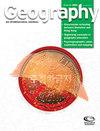将气候模型与社区需求联系起来
IF 1.1
4区 社会学
Q2 GEOGRAPHY
引用次数: 0
摘要
人们越来越认识到,有必要预测未来的气候变化,以便我们能够深谋远虑地应对它。然而,“先预测后行动”的气候适应方法可能并不合适,因为如果未来的条件与预测的不同,在一种情况下看似最佳的计划可能会被后悔(Johnson, 2021)。气候模型已经产生了如此多关于地球潜在未来的信息,以至于气候科学家现在正在努力解决如何继续存储所有数据的问题(Baker et al., 2016)。我们需要反思这些信息如何能够以有意义且不不适应的方式为气候行动提供信息,这需要讨论什么是气候模型,它们可以提供什么信息,以及如何使其对社区“可用”(Dilling和Lemos, 2011)。本文章由计算机程序翻译,如有差异,请以英文原文为准。
Connecting climate models to community needs
Introduction It is increasingly being recognised that there is a need to anticipate future climate change so that we can respond to it with forethought. However, a ‘predict then act’ approach to climate adaptation might not be appropriate because plans that seem optimal under one scenario may be regretted if future conditions are different to what was projected (Johnson, 2021). Climate models have already generated so much information about the potential futures of our planet that climate scientists are now grappling with how to continue storing all the data (Baker et al., 2016). We need to reflect on how such information can inform climate action in ways that are meaningful and not maladaptive, and this requires a conversation about what climate models are, what information they can provide and how to make it ‘usable’ (Dilling and Lemos, 2011) for communities.
求助全文
通过发布文献求助,成功后即可免费获取论文全文。
去求助
来源期刊

Geography
GEOGRAPHY-
CiteScore
1.70
自引率
21.40%
发文量
21
期刊介绍:
An international journal, Geography meets the interests of lecturers, teachers and students in post-16 geography.
 求助内容:
求助内容: 应助结果提醒方式:
应助结果提醒方式:


